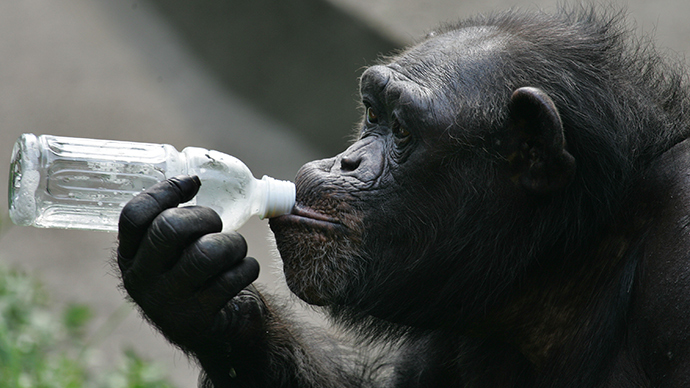Jungle juice! Wild chimpanzees regularly drink alcohol, scientists find

Humans may be not the only ones partial to a booze-up. Wild chimpanzees may also have a drinking habit: researchers found a group of chimps regularly enjoying alcohol and getting drunk in the wild.
A group of scientists from the Oxford Brookes University in England led by Kimberley Hockings, has been observing chimpanzees near the Bossou village in Guinea, West Africa. They confirmed for the first time they have proof of wild apes frequently drinking alcohol.
The researchers studied chimps living near the village from 1995 to 2012. They recorded 51 instances of apes drinking a fermented brew.
The results of their study were revealed in the Open Science journal on June 10.
The Bossou villagers produce palm wine by cutting raffia palm trees and harvesting their sap with plastic containers placed near the trees’ crowns. The containers are left unattended for most of the day.
The rise of the apes? Chimp downs drone with a stick https://t.co/vibiYWi2Kcpic.twitter.com/iVX40EA27n
— RT (@RT_com) April 14, 2015
The sap in the containers ferments into an alcoholic brew in a matter of hours. The chimps come along and “craft” drinking vessels from leaves, which they use to imbibe the intoxicating liquid.
"I was fascinated by this behavior," study lead author Kimberley Hockings, a behavioral ecologist at Oxford Brookes University in England, told Live Science.
"Chimpanzees at Bossou have applied their knowledge of how to make and use leafy tools to exploit a new liquid resource — palm wine. This new use of elementary technology shows once again how clever and enterprising humankind's nearest living relations are.”
In their report, scientists say chimpanzees drank on average a liter of the fermented brew each time, with male and female animals equally inclined to a tipple.
READ MORE: 'Bees with Alzheimer’s?' Aluminium pollution linked to dementia in bees
Male chimpanzees appeared in 34 out of 51 instances of drinking with one particular male, named Foaf, appearing 14 times. However, 13 of the 26 apes observed were total abstainers.
Some chimps apparently also got drunk.
“On one occasion after drinking palm wine, one adult male chimpanzee seemed particularly restless and whilst other chimpanzees were making and settling into their night nests, he spent an additional hour moving from tree to tree in an agitated manner," Hockings noted in the study papers.
The fact that humans and their closest relatives not only share the ability to metabolize ethanol (i.e. alcohol), but also appear to have a common drinking habit reignited the debate about the “drunken monkey hypothesis”.
According to this theory, during human evolution, natural selection favored primates with an attraction to alcohol because it gave some evolutionary benefits. Alcohol served as an appetite stimulant and gave our human ancestors the ability to consume overripe and fermented fruits.
Argentine court extends some basic human rights to an Orangutan named Sandra http://t.co/PtjtcRQMfdpic.twitter.com/gp1R1o4qrJ
— RT (@RT_com) December 22, 2014
The advocates of this hypothesis say the benefits given by the ability to consume alcohol may have resulted in attraction to alcohol being favored in the evolutionary process.
However, Kimberley Hockings noted the results of the study don’t confirm the “drunken monkey hypothesis” as the scientists can’t say for sure if the apes were attracted specifically to alcohol. She also noted that even if the researchers can’t claim the chimps got drunk on a regular basis, “the amounts they consumed were enough to elicit behavioral changes in humans.
“Our data clearly show that alcohol is not an absolute deterrent to chimpanzee feeding in this community," she added.
Professor Hockings suggested future experiments that involve giving chimps access to alcoholic as well as nonalcoholic sap, could












